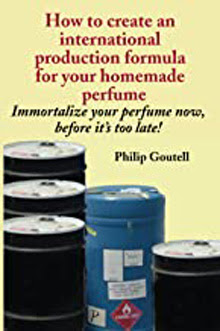I started the summer with a list of four fragrances I wanted to work on -- two for women, two for men. Two had been started (or "finished") in the past but hadn't been (to me) entirely satisfactory. Two were brand new ideas based on smell memories, one recent; one so old, so from another time in another country that it is only a vague remembrance which, hopefully, some experimentation with raw materials will refresh for me.
So this was the summer plan -- overly ambitious. I thought that I could at least sketch out the bare bones of these fragrances -- discover the critical notes and modifiers I wanted -- but I got sidetracked.
It's a bit of a story (told elsewhere) but, "by popular demand," I was brought back to a fragrance I had done five years ago. I had the formula and I had the materials to make it. But why settle for the original when (by my nose) it could stand some improvement?
I hadn't intended to spend much time on this other fragrance which I liked but felt was imperfect. So I ran it through one of the "wizards" in The Perfumer's Workbook to see what modifications the wizard might suggest. First the wizard was asked to adjust for "greater smoothness." Indeed the original formula had rough edges in its transitions from one note to the next. The wizard's suggestions were good. The new version was smoother -- more "professional" if you will.
Next, I asked the wizard to modify the formula for "depth" -- suggestions for improving the formula by adding really tiny amounts of new materials. The wizard came back with a suggestion that would have tripled the number of materials in the formula -- without changing its personality.
The problem that now arises is one of measurement. When you are working with very small batches -- because you don't have and can't afford the quantity of materials that would be needed to make up larger batches -- adding touches of aroma materials becomes highly unscientific, highly imprecise. I have developed my method for doing this (wetting the tip of a toothpick and using it to stir). Others probably have theirs. A larger company would simply make up a larger batch so there would be no tiny, hard to measure, additions.
No one says you have to follow the "depth wizard" exactly. Personally I find it useful to look over the wizard's suggestions and, if I am not familiar with particular materials that have been suggested, I try to find out more about then and, if something seems "right" for my project, I'll order a small supply to see how it performs.
Sometimes when I use this software, these computer wizards, I feel like I'm cheating. I feel like, gosh. I should have been able to do this without any help. But the fact is that I learn from the wizard. It expands my knowledge of aroma materials and forces me to work harder, more methodically, and not just by trial and error with my own personal and very limited knowledge.
Five years ago when I wrote the formula in question I was was working with perhaps forty aroma materials. Today I'm working with well over 100. As a result, my formulas have become more refined.
The Perfumer's Workbook, for me, has been a great learning tool. While it can create a fragrance for your from scratch, I don't use it that way. My own method is to start with a few aroma materials and sketch out my theme. Only when I'm well into a project -- with my ideas -- do I begin to consult the wizard for suggestions. It's like having a senior perfumer looking over your shoulder and giving you a small but incredibly useful helping hand.
One thing more. The suggestions that the wizard gave me for my 5-year-old formula opened my eyes to an aroma material that, as it turns out, is perfect for one of the men's fragrances I'm working on. By circumstances which I won't go into, I had some on hand and found it to be "just right" for one note I was looking for. And it's use was totally new to me.
Having a good teacher can allow us to go faster and farther with our studies. And here, the "teacher" -- a very good teacher -- is nothing more than a computer program!
Friday, July 9, 2010
Subscribe to:
Post Comments (Atom)


No comments:
Post a Comment